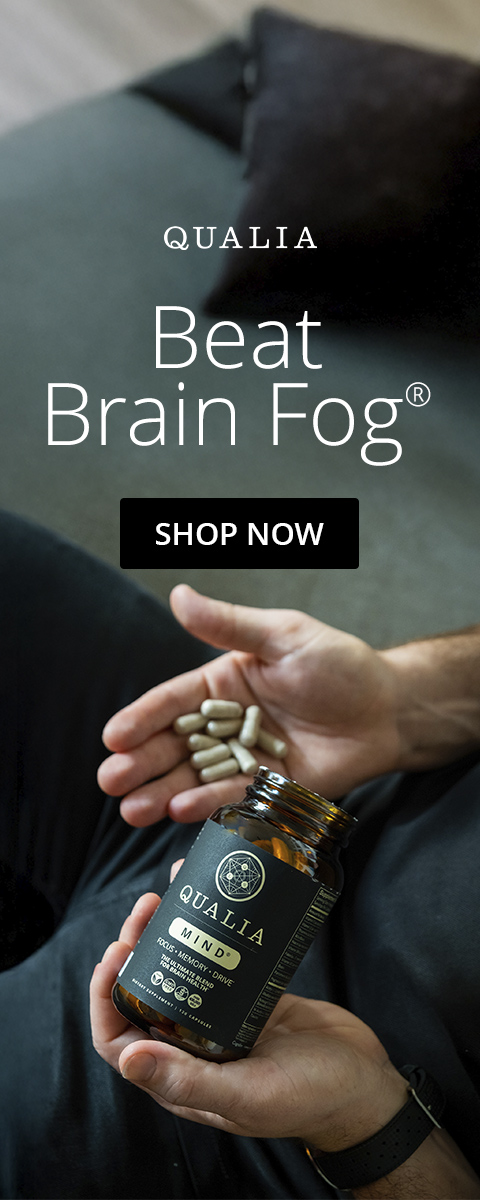As makers of one of the most loved nootropics on the market, Qualia Mind, it's our birthright to explore in depth the functions, effects and mechanisms of nootropic activity. So that leads us to the question, what are nootropics?
What Are Nootropics?
Nootropics are substances that enhance cognitive function and performance in healthy individuals. Nootropics do so by supporting and protecting, either directly or indirectly, the functional and structural status of the brain.
Nootropics have become increasingly popular in recent years because 1) they’re easy to use—they’re ingredients you can take in a pill or beverage; and 2) because they’re versatile—they target different aspects of performance and can be combined in myriad ways according to the outcomes you’re looking for.
In this article, we’ll see how nootropics work and answer some of the most common questions we get asked about nootropics.
A Brief History of Nootropics
The term nootropic was coined in 1972, originally in French as nootrope, by the Romanian psychologist and chemist Corneliu E. Giurgea. The term is derived from the Greek words nous (mind) and trepein (turn, bend), therefore meaning something like “mind-bender”. Corneliu Giurgea was the scientist who pioneered early nootropics that were believed to act as cognitive enhancers.
Giurgea laid down some characteristics a substance should have in order to qualify as a nootropic: it should enhance memory and learning, increase resistance of brain function to disruptive conditions, protect the brain from physical and chemical injuries, and improve neuronal firing control, while having very few or no side effects and being virtually non-toxic [2].
Over the last decades, the concept has evolved and become broader. In its current common usage, the word nootropic has become an umbrella term for any bioactive substance believed to act on the central nervous system to enhance cognitive function, mood, and/or sociability in healthy individuals.
Nootropics are compounds that act on the central nervous system to enhance cognition and behavior.
But although the term was only coined in the 1970s, people have actually been using nootropics for centuries. Caffeine is the most obvious example that pops to mind: drinking coffee is an ancient human habit, and it’s probably not just because it tastes good, but also (or maybe mostly) because of its mental stimulating effects. Caffeine is a psychoactive compound—a brain stimulant that promotes wakefulness and enhances attention, reaction time, and information processing [4,5]. Therefore, our coffee drinking habit is an age-old example of neurohacking and caffeine, an ancient nootropic.
Do Nootropics Really Work?
To qualify as a nootropic, a compound must be able to influence brain function. So, in theory, a compound should only be called a nootropic if it really does work. But it can be difficult to determine what is a nootropic and what is not. This leads us to another question: what type of evidence do we need to classify a compound as a nootropic?
The most robust type of evidence comes from high-quality scientific studies in which the effect of a given compound is compared to that of a control. These are known as randomized placebo-controlled clinical trials. There are indeed many nootropic compounds that have been studied in this type of trial and that have shown evidence of safely enhancing cognitive function.
In general, there is still a great need for more and better studies in healthy individuals. Still, since there are compounds that have shown nootropic benefits in rigorous scientific studies in humans, we believe we can say with confidence that there are nootropics that do work, for sure.
Another type of evidence comes from pre-clinical studies which are carried out in research animals or in vitro (i.e., using cells or fragments of tissues in which pathways and mechanisms can be studied). Although these do not provide the robust evidence of working in humans that a placebo-controlled trial would, they may provide proof of mechanism and proof of principle, i.e., they may show that a given compound targets a certain process or pathway of interest in such a way that may potentially lead to the enhancement of cognitive function. There are many nootropics whose use, and our understanding of how they function in the brain, is based on this type of evidence.
Additionally, there is also anecdotal evidence—what we call N of 1 experiences—from biohackers and the nootropic community. There are many people in this community who carefully experiment with individual nootropics and nootropic stacks and share their findings in detail. This is valuable information because the sum of many N of 1 experiences allows us to find patterns of efficacy and safety.
Types of Nootropics
Other than caffeine, mentioned above, some of the most popular nootropics include, for example:
L-theanine (an amino acid found in tea)
Choline (an essential dietary nutrient)
Ginkgo biloba (a Traditional Chinese Medicine herb)
Lion’s Mane (a mushroom)
How Do Nootropics Work?
Substances with nootropic activity are abundant; they can be natural compounds such as vitamins, minerals, amino acids, herbs or other botanicals, mushrooms, or other dietary substances; or they can be synthetic compounds.
And just as there are many different types of nootropics, there are many different types of mechanisms of nootropic activity, depending on what a compound targets, which can be:
neurotransmitter synthesis and recycling;
neuronal communication and synaptic transmission;
cerebral blood flow;
cerebral metabolism and energy production;
neurogenesis, synaptogenesis, and neuronal growth;
neuroprotection and cerebral detoxification.
The cognitive enhancing effects of nootropics are a consequence, either direct or indirect, of these types of actions. Many nootropic molecules do nothing more than supporting the brain’s natural physiological processes. By doing so, they are naturally able to support whichever function those physiological processes themselves support: memory and learning, executive functions, language, perception, reasoning, attention, focus, creativity, motivation, mood, sociability.
Can Cognition Really Be Enhanced?
Cognition is a higher-order function of the human brain that emerges from many intersecting brain functions and physiological processes [6]. It involves all aspects of perception, experience, and thought: sensory perception, attention, memory and learning, language comprehension and speech production, association, concept formation, pattern recognition, reasoning, planning, problem-solving, decision-making, and abstract thinking. Cognition generates knowledge from experience, allows us to imagine and create, gives us the capacity to predict the outcomes of our behaviors, and allows us to dynamically adjust them based on our continually shifting perceptions and goals.
Cognition relies on the proper function of an intricate network of neurons communicating through synapses and using neurotransmitters as messengers, assisted by glial cells that structurally and functionally support and protect them, and fueled by a steady blood supply of oxygen and nutrients that sustain their high energy demand.
An important aspect of all these processes is that they are ever changing: there is a continuous creation of new neuronal connections, a constant adjustment of synapses, and a ceaseless fine-tuning of neurotransmitter signaling. The dynamic adaptability of these brain functions and mechanisms is a core characteristic of the brain, known as brain plasticity. What this means is that cognitive performance is not an immutable personal trait—it’s a reactive property of brain function.
Healthy cognition is a property of a healthy brain. It depends on the structural integrity of the brain and on the efficiency of neurobiological processes. Our mind performs at its best when every element of the cognitive machinery is working optimally. And this depends on such diverse factors as our diet, our mood, or the quality of our sleep.
Cognition can be enhanced and we have agency over our mental performance. As Corneliu Giurgea said, "Man is not going to wait passively for millions of years before evolution offers him a better brain.”
We can make healthy lifestyle choices that support a healthy brain. We can also take advantage of the tools we have at our disposal to support brain function. This is where nootropics come in.
How Do Nootropics Support Neurotransmitter Synthesis?
Neurotransmitters are the molecules that control memory, focus, attention, information processing, mood, motivation, etc. When communication through neurotransmitters is efficient, whatever message they’re conveying, or whatever function they’re controlling is also more efficient.
Neurotransmitters are constantly being produced by the brain, either from scratch (the technical term is de novo synthesis) or by recycling neurotransmitter molecules that have been used in neurotransmission and inactivated through metabolization to other compounds. These processes involve the activity of a number of enzymes, enzyme cofactors, precursors, and membrane transporters, for example.
Nootropics may support neurotransmitter synthesis by supporting the activity of all these molecules and structures. In fact, some compounds may have nootropic activity because they are those molecules.
We’ve written a couple of articles where you may learn more about supporting neurotransmitter synthesis and find examples of nootropics that support it: What is Acetylcholine? and What is Dopamine?.
Supporting Brain Structure
You can’t optimize brain function without proper structural support. This means maintaining the structural integrity of the nervous system by 1) supporting the generation of new neurons (neurogenesis); 2) supporting neuronal structure—the growth of neuronal branches and their myelination; 3) supporting glial cell activity—the cells that provide functional and structural support and protection for neurons; 4) supporting the nervous system’s ability to repair damage.
Nootropics that support these functions help to maintain the integrity of the neuronal communication network, and consequently, its function.
You can learn about neurogenesis and how to support it in our article “What is Neurogenesis?”.
Supporting Neuroprotection
Another very important key to the optimization of brain performance is neuroprotection—the protection of the structure and function of the nervous system.
One of the most constant challenges to brain health is the production of damaging metabolic byproducts. All cells generate damaging metabolic byproducts as they produce cellular energy, particularly a type of molecules known as reactive oxygen species (ROS). ROS are exceptionally damaging: they can oxidize molecules and cellular structures to the point of them losing their functionality [8].
Because the brain has such a high metabolic activity, it also has a very high production of ROS, which puts it at greater risk of oxidative damage. Fortunately, brain cells (and all other cells) have a number of antioxidant defenses against these molecules, such as enzymes and other antioxidant molecules that inactivate ROS. But sometimes an imbalance arises between the production of ROS and the cells’ ability to inactivate them, leading to what is known as oxidative stress.
But it’s not just ROS that pose a threat to the brain. Immune signaling molecules (cytokines), for example, may also be damaging if their activity gets imbalanced.
And this is another mechanism through which nootropics help to support and enhance cognitive function: by supporting the brain’s ability to control the levels and eliminate the excess of ROS and other damaging molecules and protect itself from their effects.
Supporting Nighttime Physiology
The brain has many functions that differ widely between day (or wakefulness) and night (or sleep). But all are important for cognitive performance. What takes place in the brain during sleep is as important for cognitive function as what takes place in the brain during wakefulness. Any bad night’s sleep will show you that.
Although there is still a lot to be learned about sleep and its functions, from the available evidence, one thing seems clear: we need to sleep because the brain needs time to rest and recover from the consequences of its very high activity during wakefulness. One such consequence is an accumulation of ROS resulting from an inability of the brain’s antioxidant defenses to fully eliminate them during the day. The brain therefore needs a daily period of time when brain activity is low enough to be able to clean up and do some maintenance. The brain also uses sleep time to organize, being an important period for memory consolidation and learning. And the more cognitively demanding the day has been, the more cleanup and organizing there is to do, leading to a greater need for quality rest.
These differences in brain activity and processes between day and night also manifest as changes in the activity of neurotransmitters and neuromodulators. For example, during wakefulness there is high activity of dopamine, noradrenaline and serotonin, which are all arousal neurotransmitters, but their activity drops considerably during the night [10].
Nootropics that support nighttime physiology—or nighttime nootropics as we call them at Qualia—contribute to next-day cognitive performance by helping the brain perform all these tasks that are going on while we sleep: rest, clean up, organize, recharge.
You can learn more about supporting the brain’s nighttime physiology in our article about the science behind Qualia Night.
Taking Advantage of Ingredient Synergy
Nootropics offer the possibility of targeting many specific pathways and processes. But what is really exciting about nootropics is the myriad possibilities created by combining them. These combinations, known as nootropic stacks, allow us to take advantage of synergistic and additive effects between different ingredients.
With knowledge about neurophysiology and neurobiology and about the mechanisms of action of nootropic molecules, nootropics can be selected and combined in ways that allow for many different targeted interventions in the brain. They may also allow for a more comprehensive support of cognitive function—what we call a whole system upgrade.
You can learn more about nootropic stacks in our article about the science behind Qualia Mind. You may also learn more about nootropic synergy and achieving a whole system upgrade in our article about The Science of Nootropic Stacks.
Are Nootropics Safe?
A common and natural concern surrounding nootropics is safety. The original definition of nootropic stated that, to be considered a nootropic, a compound should have very few or no side effects and extremely low toxicity. And, indeed, in general, we can say that the most commonly used nootropics—which tend to be the most extensively studied—are indeed well tolerated by most healthy individuals, showing only minor occasional and reversible side effects.
Among the most common nootropics, there are many compounds approved as dietary supplements and classified as GRAS (generally recognized as safe) by the US Food and Drug Administration (FDA). Many are herbal extracts that have been used in traditional medicines for centuries. And many are extracts of plants that are commonly consumed as food and that therefore tend to be regarded as safe.
A key aspect to keep in mind is that “the dose makes the poison.” Dose is a key determinant of a compound’s safety and how we respond to it—an ingredient that can be beneficial for performance can become way less beneficial or even hinder performance when taken in excessive amounts. That’s why Qualia puts a lot of thought into ingredient dosing. If you want to learn more about it, we’ve written a whole article about our dosing principles.
Support Mental Performance With Qualia Mind
Qualia Mind supports your body’s own ability to upregulate the production of key neurotransmitters, BDNF (Brain-Derived Neurotrophic Factor), and other pathways that are critical for optimal brain function. When you give your brain the fuel it needs to perform its best, magic happens. Learn more about why Qualia Mind is the world’s most advanced cognitive support supplement.*
References
[1]C. Giurgea, Actual. Pharmacol. 25 (1972) 115–156.
[2]C. Giurgea, M. Salama, Prog. Neuropsychopharmacol. 1 (1977) 235–247.
[3]C. Giurgea, Cond. Reflex 8 (1973) 108–115.
[4]T.M. McLellan, J.A. Caldwell, H.R. Lieberman, Neurosci. Biobehav. Rev. 71 (2016) 294–312.
[5]S.J.L. Einöther, T. Giesbrecht, Psychopharmacology 225 (2013) 251–274.
[6]D. Tranel, G. Cooper, R.L. Rodnitzky, in: P.M. Conn (Ed.), Neuroscience in Medicine, Humana Press, Totowa, NJ, 2003, pp. 621–639.
[7]S. Brady, G. Siegel, R. Wayne Albers, D. Price, Basic Neurochemistry: Principles of Molecular, Cellular, and Medical Neurobiology, Academic Press, 2011.
[8]M. Schieber, N.S. Chandel, Curr. Biol. 24 (2014) R453–62.
[9]I. Hajjar, S.S. Hayek, F.C. Goldstein, G. Martin, D.P. Jones, A. Quyyumi, J. Neuroinflammation 15 (2018) 17.
[10]A.S. Tubbs, H.K. Dollish, F. Fernandez, M.A. Grandner, in: M.A. Grandner (Ed.), Sleep and Health, Academic Press, 2019, pp. 3–10.
*These statements have not been evaluated by the Food and Drug Administration. This product is not intended to diagnose, treat, cure, or prevent any disease.








No Comments Yet
Sign in or Register to Comment